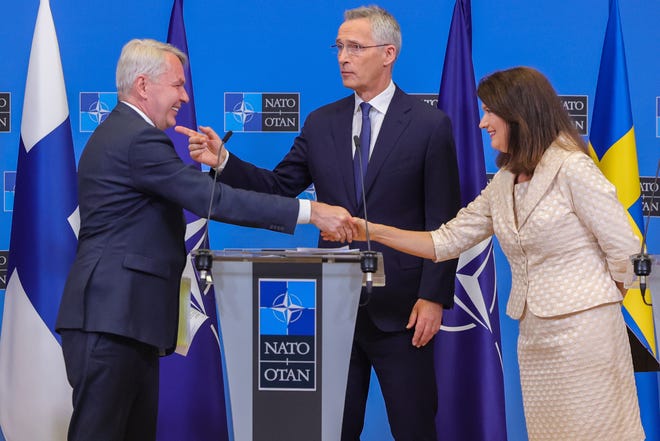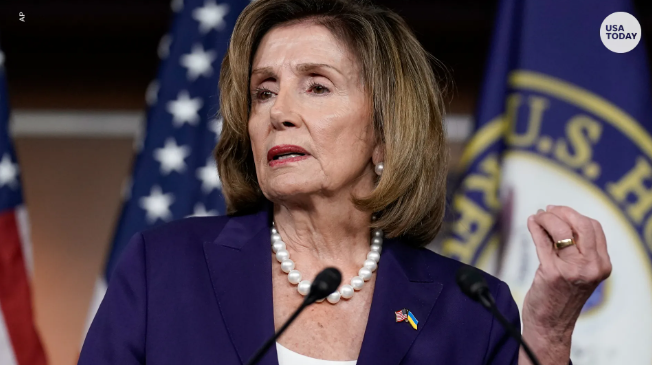WASHINGTON — The U.S. Senate on Wednesday overwhelmingly passed a resolution approving Finland and Sweden’s request to join the NATO, a pivotal step toward expanding the 30-member transatlantic military alliance.
The bipartisan show of support for Finland and Sweden’s accession to NATO is a direct response to Russia’s invasion of Ukraine, an act of aggression that has alarmed U.S. and European officials. The vote was 95-1.
Finland and Sweden’s bid to join NATO will need to win approval from all other NATO countries, a process that could take months and that, when completed, would grant Article Five protection to the two historically neutral countries.
In the meantime, the countries are considered NATO partners and have been participating in military exercises with the U.S. and other NATO nations.

The latest:
- What senators passed: A resolution approving Sweden and Finland’s accession to NATO. Lawmakers approved one amendment stating that all NATO members should spend at least 2% of their gross domestic product on defense and 20% of their defense budgets on major equipment, including research and development.
- Who voted against it: Sen. Josh Hawley, R-Mo.
- When it will take effect: Membership will not take full effect until all 30 NATO member nations ratify the accession protocols.
- Stumbling block: Turkey initially opposed Sweden and Finland’s bid to join the alliance, and its parliament has not yet approved their membership.
- What Turkey sought: Turkey had insisted the two Nordic nations renounce support for a Kurdish militant group in Syria, demanded they extradite people that Ankara suspects of terrorist activity and pushed for them to lift an embargo on arms exports to Turkey.
- Potential problems: Turkish President Recep Tayyip Erdoğan said last month that Turkey could “freeze” the process if Sweden and Finland do not adhere to a June deal the three countries struck in Madrid at a NATO summit.
- Defense spending: NATO nations have agreed to put 2% of their GDP toward defense spending. Sweden is currently on track to reach the full amount by 2028, but that timeline could shift depending on the outcome of the nation’s upcoming elections. Finland’s defense spending currently exceeds 2% GDP.
What’s about to happen
The document now heads to President Joe Biden’s desk. He must sign the resolution twice before the State Department can affix the U.S. seal to make it official. Secretary of State Antony Blinken will also sign the document.
Top takeaways
Washington had promised swift ratification of the resolution, and the U.S. hoped to lead NATO nations in welcoming the European countries to the alliance. But partisan fights over unrelated spending bills drew out the process. The United States is currently on track to become the 22nd nation to complete the process.
What they are saying
- “I think it sends a very strong statement of our support of these countries to join NATO, and our continuing position of leadership in NATO and in the world. When we do this, we lead by example,” Senate Foreign Relations Committee Chairman Bob Menendez, D-N.Y., said prior to the vote.
- Sen. John Barrasso, a member of GOP leadership in the Senate who sits on the committee, said ahead of the vote, “We want to send a strong message the United States is committed to this to get the other countries lined up.”
- Sen. Lindsey Graham, R-S.C., offered a “shoutout” to Russian leader Vladimir Putin, saying he made Wednesday’s vote possible. “Without you we wouldn’t be here. You’ve done more to strengthen NATO than any speech I could ever hope to give.”
- Sen. Rand Paul, R-Ky., warned that granting NATO membership to Sweden and Finland would come at a cost because Russia would not tolerate an expansion of weapons systems into Finland. “Is it worth the risk?” he asked.
- Hawley said the U.S. should focus on deterring China instead of expanding NATO, which he said would mean committing additional military forces and firepower in Europe over the long run.
- “This isn’t over until it’s over,” said Kathleen McInnis, a senior fellow at the Center for Strategic and International Studies. “Turkey is already starting to throw red cards into the mix.”
Karin Olofsdotter, Sweden’s ambassador to the U.S., said in an interview with USA TODAY that without Sweden and Finland, it makes it “much more difficult to plan for the security” of the Baltic region.
Why it matters
Olofsdotter said the expansion would augment security across the NATO alliance. “We make it easier, or less burdensome, for the United States or any other NATO member to come to the defense of northern Europe because we add security,” she said.
Want to know more? Here’s what you missed
‘A KICK IN THE GUT’:Finland’s, Sweden’s drive to join NATO a defeat for Putin, a win for the West
‘A CRITICAL MOMENT FOR OUR SECURITY’:Finland, Sweden submit NATO membership application, driven by security fears over Russia
